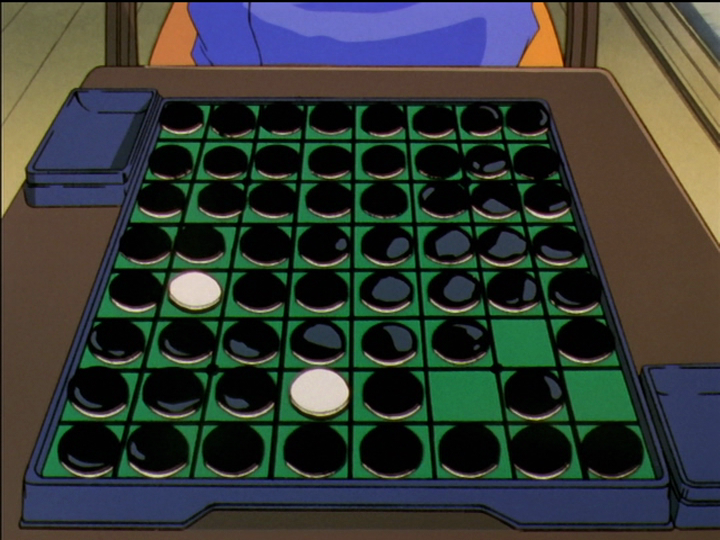In episode 33, Utena plays othello (or reversi (Wikipedia) to use the original 19th century name—there are slight rule differences) against Akio. At least, they are playing on an othello board with othello pieces. But the board positions we are shown make no sense as an othello game.
Each disk has a white side and a black side. Utena is playing white. When she places a white disk on a square, lines of black disks are flipped to white according to a simple rule (not that it’s a simple game). The reverse for her opponent, of course.



The first position we’re shown looks like a normal othello position that might occur between novice players. White is winning, because the black disk at lower right gives white eventual access to the adjacent corner square. Once taken by white, black can never flip the corner back, so it’s permanently white, and white can use it as a base to get further permanently white squares.
The second position cannot be reached from the first, no matter how the players move. There is no way for the white disk in the lower left to have gotten there. Besides that, only two of the 13 previously placed disks have been flipped. That is virtually impossible in a real othello game. Could they be playing some other game with the same equipment? (My answer: No.)
In the third position, black has won, though there are three moves left to play. The score will be 58-6 for black. This position also cannot be reached from the second. Under the rules, there is no way for the three white disks in a vertical line on the right side of the board to have been flipped. Was Akio using her inattention to cheat? (My answer: No—not on the game board.) I also notice that the trays of disks are empty a little prematurely. (My thought: Intentional.)
The slightly closer view of the board in the third picture implies that Akio has leaned forward a little at the end of the game. In the context of the scene, it’s meaningful: To win, he lured Utena’s attention to him and off the game. He won the symbolic endgame, now he is pressing toward the real endgame. Utena pays awesome attention to detail.
The othello game is a metaphor for Akio finessing the mating game to get his way, and whether it’s valid othello or not doesn’t matter. Does it? Doesn’t Utena pay awesome attention to detail?
The staff had no reason to make the othello game realistic, and good reason not to. Like unstable locations, it is a symbol that reality is an illusion. What we see on the screen reflects the mindset of the point-of-view character. We see their illusions.
The intended meaning. The disk counts on the board are supposed to tell the audience who is winning at each point, even though in a real game they don’t. Whether the staff knew othello or not, the audience was not expected to. The first position has Utena 7 - 6 Akio. The second has Utena 17 - 9 Akio. It’s meant to suggest that Utena pulled ahead at first. The game displays a conventional dramatic turnaround.
And yet, and yet. It is possible to read the nonsense of the game as a second metaphor, pointing out Akio’s nigh-godlike powers of manipulation, to the extent that he can achieve the impossible: As he can get away with illegal moves in a game, he can get away with impossible actions in reality, whether by cheating or by skill that surpasses psychology. I don’t buy it; I think it’s an example of the effect I was talking about in flawless art.
I can read still another metaphor in the choice of othello as the game, with the same flawless art caveat. In othello, to win you don’t immediately try to flip as many disks as you can to your color. Then your opponent can easily flip them back. Instead you play to restrict your opponent’s options. When they have no good choices, then you can flip disks your way and keep them. It is similar to one of the tricks Akio uses in the hotel to control Utena’s actions: He physically restricts her options so that she has few choices other than to do what Akio wants. He drove her there, so that she cannot return home until he chooses. He removed the telephone so that she cannot call out.
I doubt the animators knew that. But possibly the scriptwriter did.
In contrast, it is surely intended that Akio plays black, his color, and Utena plays white, the color of the prince. And it may be meaningful that, under the rules, black plays first.
Jay Scott <jay@satirist.org>
first posted 20 November 2021
updated 19 September 2023